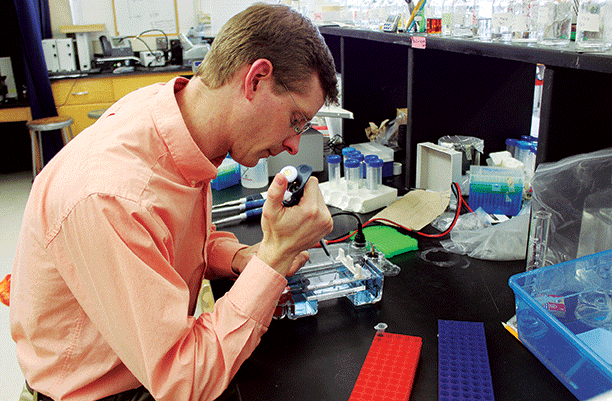Plant research receives grant for funding
UW-Eau Claire faculty and students use grant money to study how plants react to light
LIGHT IT UP: Derek Gingerich works in the lab on the fourth floor of Phillips researching the way plants respond to light signals. © 2014 Emily Albrent
Derek Gingerich, associate professor of biology at UW-Eau Claire, received a three- year, $214,510 grant from the National Science Foundation to further a faculty-student research project on how plants react to light signals.
“We are particularly interested in how that happens at the molecular level,” Gingerich said. “How are light signals perceived, how do plants interpret those signals and how do plants then change their growth and development in response to changes to their light environment.”
He started the work when he was a postdoctoral student at UW-Madison and continued the work through his teaching at Eau Claire. He said basic research expands our knowledge of light signals.
“That’s very important for plants, as photosynthetic organisms they have to acquire light for energy and so they’re very sensitive to what the light environment is and so by understanding these signaling systems and these perception systems, we can gain a better understanding of how plants responds to light,” Gingerich said.
Understanding how plants respond to light helps outside of the lab. Gingerich said this work may have some implications for agriculture.
“Responses to light signals are important for crop plants,” Gingerich said. “They affect the way the plants grow and develop, affect things like how plants respond to pathogens or pests, so the more we understand about light signaling the more potential it is to help guide the way crop plants are bred and developed.”
He said receiving this grant was important to him because it allowed him to involve students in his research. The grant includes money to pay students during the academic and summer term and also pays for travel costs for students to go to conferences where they can meet and network with other people in the field.
For a biology student who is interested in going into a research career, Gingerich said having the opportunity to do research as an undergraduate is a great opportunity
Gavin Sunde, senior biology major, started working on this project with Gingerich his freshman year.
“This was an opportunity to work and to try to find new genes that are involved in the red light signaling pathway,” Sunde said.
Sunde said Gingerich won a grant in 2009 from NSF that paid for research, which was used in the proposal for the current grant and will go into effect this summer.
“I have learned a lot about plants and how research is really conducted,” Sunde said. “I have also been able to attend some conferences … I got to learn a lot about what the new science discoveries are and how that process actually occurs.”
Grants Coordinator Heather Johnson Schmitz and the staff at the Office of Research and Sponsored Programs on campus assisted Gingerich with the details of his grant proposal.
“We try to take care of all the logistics so that the faculty person can focus on the heart which is the narrative, the science, only they know that,” Johnson Schmitz said. “That’s their passion.”
Because Gingerich had a prior award with NSF, he had a certain amount of built-up credibility and it was the next natural step to apply for a grant from NSF again, Johnson Schmitz said.
Gingerich said he will continue his research for years to come, even after the three years of the grant have expired.






